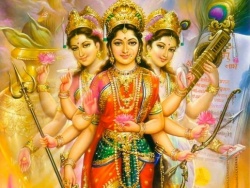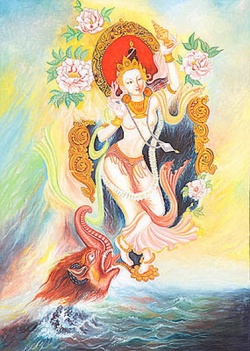Powers of the devas
From a human perspective, devas share the characteristic of being invisible to the physical human eye. The presence of a deva can be detected by those humans who have opened the divyacak?us (Pali: dibbacakkhu), an extrasensory power by which one can see beings from other planes. Their voices can also be heard by those who have cultivated divyasrotra, a similar power of the ear.
Most devas are also capable of constructing illusory forms by which they can manifest themselves to the beings of lower worlds; higher and lower devas even have to do this between each other.
Devas do not require the same kind of sustenance as humans do, although the lower kinds do eat and drink. The higher sorts of deva shine with their own intrinsic luminosity.
Devas are also capable of moving great distances speedily and of flying through the air, although the lower devas sometimes accomplish this through magical aids such as a flying chariot.
From a human perspective, devas share the characteristic of generally being invisible to the physical human eye. But the presence of a deva can be detected by those who have opened the "divine eye" (Sanskrit, divyacakṣus; Pāli, dibbacakkhu), an extrasensory power by which one can see beings on other planes. Their voices can also be heard by those who have cultivated a similar power of the ear. Most devas are also capable of constructing illusory forms so as to manifest themselves to beings in worlds lower than their own. Higher and lower devas must also do this between each other.
Devas do not require the same food or sustenance as humans, although the lower kinds do eat and drink. Higher devas shine with their own intrinsic luminosity. Indeed, the word deva means "shining one." They are capable of quickly moving great distances, flying, although the lower devas sometimes accomplish this through flying vehicles (viman, or spacecraft). Bhumi or earthbound devas are sprites and elementals, whereas akasha or spacebound devas would seem to be extraterrestrial aliens (celestial travelers, "gods" from the heavens) who provided a great deal of useful information and technology but also caused war here.
Although the word deva is generally translated "god" (or even angel) in English, the Buddhist conception of devas differs from the gods, God, or angels of Western religions past and present.
Devas are long-lived but not immortal; when they pass away, they are reborn according to their karma, which means they could end up anywhere else: another kind of deva, human, or worse.
They do not create, shape, or bring about the dissolution of the world. Like everyone else they come into existence based on their past deeds and are subject to the natural law (or regularity) of cause and effect.
They are not incarnations nor mere symbols of a few archetypal deities or manifestations of an all-embracing pantheistic One. Like humans they are considered distinct individuals with their own personalities and paths in life.
They are not omniscient. Their knowledge is inferior to a Buddha, and even some humans, especially lacking awareness of beings in worlds higher than their own.
They are far from omnipotent. Their powers tend to be limited to their own worlds, and they rarely intervene in human affairs. When they do, it is generally by way of quiet advice rather than by physical intercession.
They are not morally perfect. Even devas of the subtle form worlds, who lack human passions and desires, are capable of ignorance, prided, and arrogance. Lower devas of the sensual realm experience the same kind of passions as humans, including (in the lowest of these worlds), lust, jealousy, anger, and all manner of foolishness. Indeed, their imperfections have caused them to be reborn in these worlds.
They are not guides the way the Buddha, Dharma, and Sangha are regarded. While some individual devas may command great moral authority and prestige and thus be deserving of a high degree of respect, no deva can show the way of escape from Saṃsāra or control one's rebirth. Therefore, devas are frequently recorded as coming to Earth for this guidance


